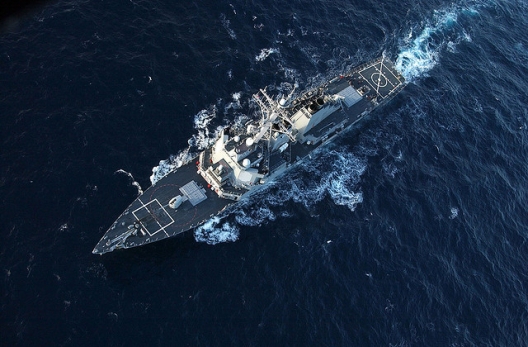 USS Donald Cook (DDG 75) is heading east, on a course that will make the ship the first of four destroyers to be forward deployed in the Naval Forces Europe operating area.
USS Donald Cook (DDG 75) is heading east, on a course that will make the ship the first of four destroyers to be forward deployed in the Naval Forces Europe operating area.
There’s been a tremendous effort put forth to get the ship to this point. It was a whole government effort, in close coordination with our Spanish ally. The end result of this collaboration will be four U.S. warships stationed in Rota, Spain, but its message is so much more.
On the surface, it’s a message of supporting our allies and partners, with multi-mission Ballistic Missile Defense-capable Aegis ships. It’s a message that is supported by our ability to rapidly respond to any crisis. But more importantly it’s a message that rings loudest because of our commitment to be continuously present where it matters, in order to respond when it matters.
With continuous presence comes an enhanced ability to train and operate with our allies and partners. Our presence also highlights the importance of U.S. relationships in the Mediterranean and our dedication to the United States’ relationship with its European allies and strong support for the NATO alliance.
Working alongside and training together with our allies and partners is generally thought of as a means to an end – in that, we train together in order to enhance our ability to respond to crises.
But partnerships are more than the sum of their individual parts; when we work together as a collective, the tasks become easier for all. When we cascade our resources and capabilities to meet a global challenge, like the proliferation of ballistic missiles, we not only are more effective, we are more efficient. This gained efficiency encourages others to participate in our collective.
So you see, it is not the technology, not the tangibles but our partnerships that matter most, and the trust that comes from our sustained presence may be the most important factor when considering how to preserve peace and maintain stability – whether that is a shared sea story among enlisted Sailors or a professional exchange between junior officers, becoming proficient at missions unique to the European theater of operations requires partnerships that are built from the deck plate up and you have to be present to do that.
But this is nothing new – our presence and partnerships with our allies in this region goes back as long as the United States has had a Navy. This forward deployment of ships is simply the latest chapter in a long, rich history. It serves as a reminder of our shared commitment with our Allies to protect against belligerent aggression and coercion that goes beyond the threat of ballistic missiles.
Admiral Bruce W. Clingan is Commander of U.S. Naval Forces Europe-Africa.
Image: USS Donald Cook (photo: Mate 1st Class Michael W. Pendergrass/US Navy)
